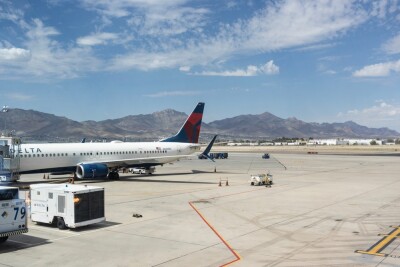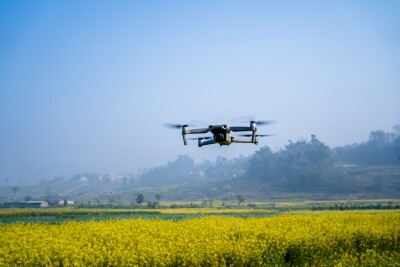 The United States Federal Aviation Administration and Department of Transportation will require drone operators flying in the US to register their aircraft. In a press conference today, US Transportation Secretary Anthony Foxx and FAA Administrator Michael Huerta announced a task force that will be charged with developing recommendations for the registration process.
The group will include 25 members from organizations such PrecisionHawk, Small UAV Coalition, the Association for Unmanned Vehicle Systems International, and the Academy of Model Aircraft.
Registration rules are intended to help the FAA combat potentially unsafe UAV operations. As Foxx explained, “registering unmanned aircraft will help build a culture of accountability and responsibility, especially with new users who have no experience operating in the U.S. aviation system. It will help protect public safety in the air and on the ground.”
The task force’s final report, to be delivered to the DOT by November 20, will advise on which aircraft should be exempt from registration due to a low safety risk, as well as whether a separate streamlined system should be made available for commercial UAV operators.
Many in the commercial UAV industry have asked what impact this news will have on the commercial UAS market, which is still awaiting final regulations from the US government.
As Colin Snow, also known as the Drone Analyst, explained to the UAV Expo, “there is concern that this is going to drag everything down. The answer is that no, there is really no impact for commercial work. This is not a detractor from the work that the FAA or DOT are doing to approve the rules for commercial UAS.”
However, Snow noted that the regulatory process poses one potential problem for commercial UAS operators: the assignment of N-numbers.
The N-number is the registration number for an aircraft. As Snow explained, the system was designed to accommodate the number of manned aircraft, which is much smaller than the total number of commercial and consumer drones. “With a million plus units being sold per year,” he said, “you run out of N-numbers.”
The FAA already requires N-numbers for commercial work, he said, so there need to be enough numbers available if that work is going to continue. This means the FAA’s current registration process would have to change. As Snow said, “that’s a big deal. That will take months.”
UAV Expo will continue reporting on these rules as more information becomes available.
The United States Federal Aviation Administration and Department of Transportation will require drone operators flying in the US to register their aircraft. In a press conference today, US Transportation Secretary Anthony Foxx and FAA Administrator Michael Huerta announced a task force that will be charged with developing recommendations for the registration process.
The group will include 25 members from organizations such PrecisionHawk, Small UAV Coalition, the Association for Unmanned Vehicle Systems International, and the Academy of Model Aircraft.
Registration rules are intended to help the FAA combat potentially unsafe UAV operations. As Foxx explained, “registering unmanned aircraft will help build a culture of accountability and responsibility, especially with new users who have no experience operating in the U.S. aviation system. It will help protect public safety in the air and on the ground.”
The task force’s final report, to be delivered to the DOT by November 20, will advise on which aircraft should be exempt from registration due to a low safety risk, as well as whether a separate streamlined system should be made available for commercial UAV operators.
Many in the commercial UAV industry have asked what impact this news will have on the commercial UAS market, which is still awaiting final regulations from the US government.
As Colin Snow, also known as the Drone Analyst, explained to the UAV Expo, “there is concern that this is going to drag everything down. The answer is that no, there is really no impact for commercial work. This is not a detractor from the work that the FAA or DOT are doing to approve the rules for commercial UAS.”
However, Snow noted that the regulatory process poses one potential problem for commercial UAS operators: the assignment of N-numbers.
The N-number is the registration number for an aircraft. As Snow explained, the system was designed to accommodate the number of manned aircraft, which is much smaller than the total number of commercial and consumer drones. “With a million plus units being sold per year,” he said, “you run out of N-numbers.”
The FAA already requires N-numbers for commercial work, he said, so there need to be enough numbers available if that work is going to continue. This means the FAA’s current registration process would have to change. As Snow said, “that’s a big deal. That will take months.”
UAV Expo will continue reporting on these rules as more information becomes available.Subscribe
The information you submit will be stored and used to communicate with you about your interest in Commercial UAV News. To understand more about how we use and store information, please refer to our privacy policy.
October 20, 2015
What the FAA and DOT Drone Registration Means for Commercial Operators
 The United States Federal Aviation Administration and Department of Transportation will require drone operators flying in the US to register their aircraft. In a press conference today, US Transportation Secretary Anthony Foxx and FAA Administrator Michael Huerta announced a task force that will be charged with developing recommendations for the registration process.
The group will include 25 members from organizations such PrecisionHawk, Small UAV Coalition, the Association for Unmanned Vehicle Systems International, and the Academy of Model Aircraft.
Registration rules are intended to help the FAA combat potentially unsafe UAV operations. As Foxx explained, “registering unmanned aircraft will help build a culture of accountability and responsibility, especially with new users who have no experience operating in the U.S. aviation system. It will help protect public safety in the air and on the ground.”
The task force’s final report, to be delivered to the DOT by November 20, will advise on which aircraft should be exempt from registration due to a low safety risk, as well as whether a separate streamlined system should be made available for commercial UAV operators.
Many in the commercial UAV industry have asked what impact this news will have on the commercial UAS market, which is still awaiting final regulations from the US government.
As Colin Snow, also known as the Drone Analyst, explained to the UAV Expo, “there is concern that this is going to drag everything down. The answer is that no, there is really no impact for commercial work. This is not a detractor from the work that the FAA or DOT are doing to approve the rules for commercial UAS.”
However, Snow noted that the regulatory process poses one potential problem for commercial UAS operators: the assignment of N-numbers.
The N-number is the registration number for an aircraft. As Snow explained, the system was designed to accommodate the number of manned aircraft, which is much smaller than the total number of commercial and consumer drones. “With a million plus units being sold per year,” he said, “you run out of N-numbers.”
The FAA already requires N-numbers for commercial work, he said, so there need to be enough numbers available if that work is going to continue. This means the FAA’s current registration process would have to change. As Snow said, “that’s a big deal. That will take months.”
UAV Expo will continue reporting on these rules as more information becomes available.
The United States Federal Aviation Administration and Department of Transportation will require drone operators flying in the US to register their aircraft. In a press conference today, US Transportation Secretary Anthony Foxx and FAA Administrator Michael Huerta announced a task force that will be charged with developing recommendations for the registration process.
The group will include 25 members from organizations such PrecisionHawk, Small UAV Coalition, the Association for Unmanned Vehicle Systems International, and the Academy of Model Aircraft.
Registration rules are intended to help the FAA combat potentially unsafe UAV operations. As Foxx explained, “registering unmanned aircraft will help build a culture of accountability and responsibility, especially with new users who have no experience operating in the U.S. aviation system. It will help protect public safety in the air and on the ground.”
The task force’s final report, to be delivered to the DOT by November 20, will advise on which aircraft should be exempt from registration due to a low safety risk, as well as whether a separate streamlined system should be made available for commercial UAV operators.
Many in the commercial UAV industry have asked what impact this news will have on the commercial UAS market, which is still awaiting final regulations from the US government.
As Colin Snow, also known as the Drone Analyst, explained to the UAV Expo, “there is concern that this is going to drag everything down. The answer is that no, there is really no impact for commercial work. This is not a detractor from the work that the FAA or DOT are doing to approve the rules for commercial UAS.”
However, Snow noted that the regulatory process poses one potential problem for commercial UAS operators: the assignment of N-numbers.
The N-number is the registration number for an aircraft. As Snow explained, the system was designed to accommodate the number of manned aircraft, which is much smaller than the total number of commercial and consumer drones. “With a million plus units being sold per year,” he said, “you run out of N-numbers.”
The FAA already requires N-numbers for commercial work, he said, so there need to be enough numbers available if that work is going to continue. This means the FAA’s current registration process would have to change. As Snow said, “that’s a big deal. That will take months.”
UAV Expo will continue reporting on these rules as more information becomes available.













Comments